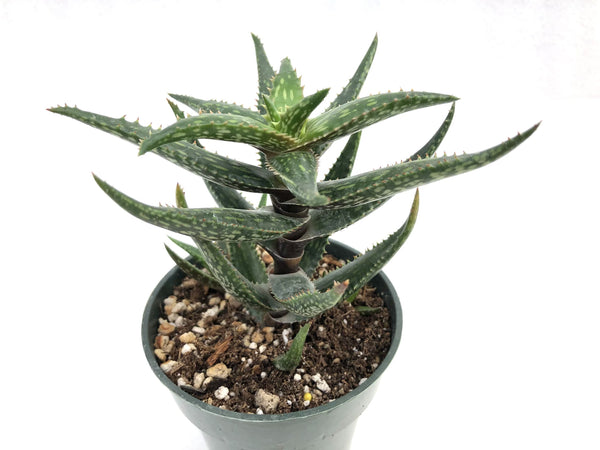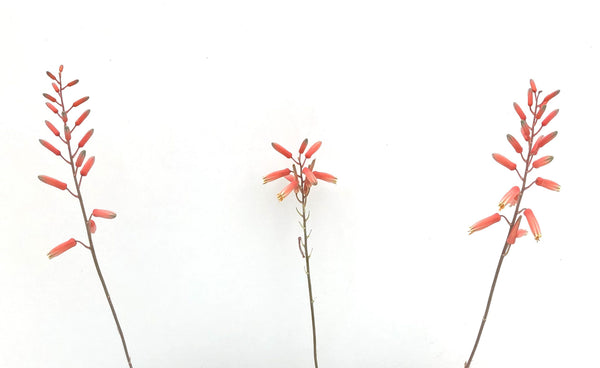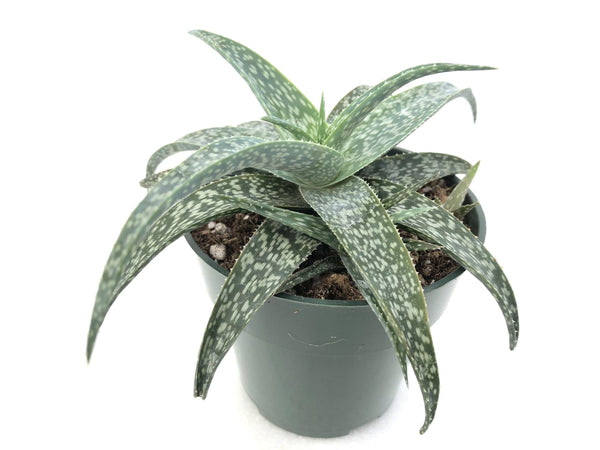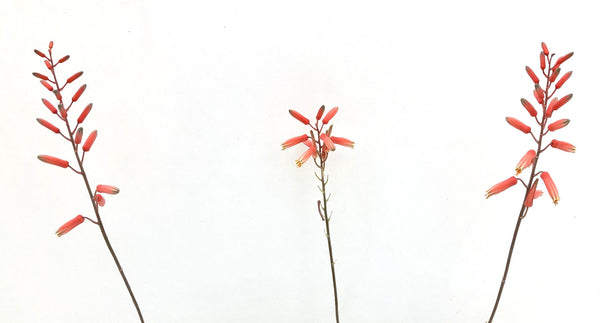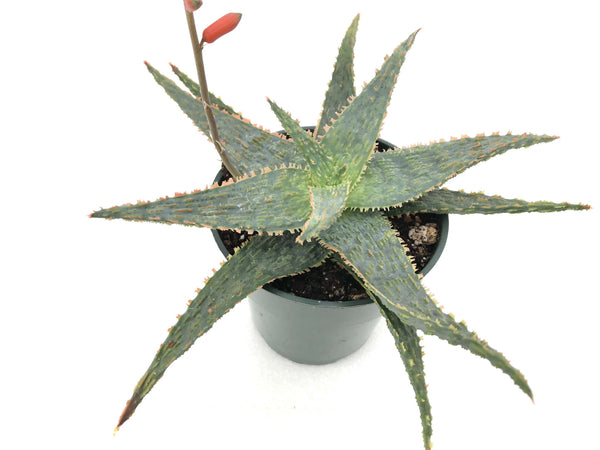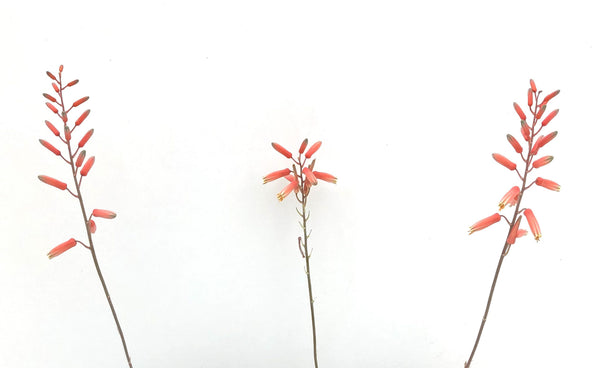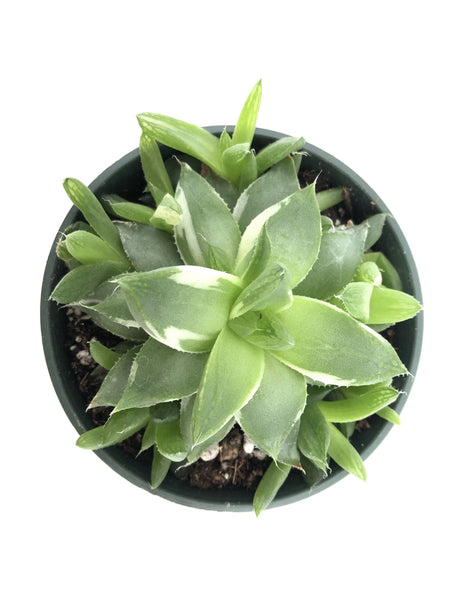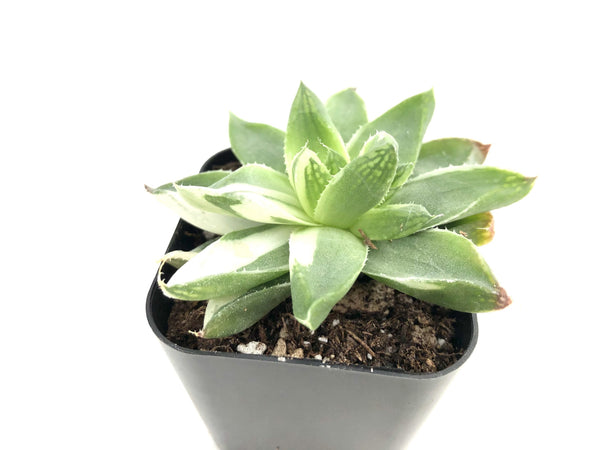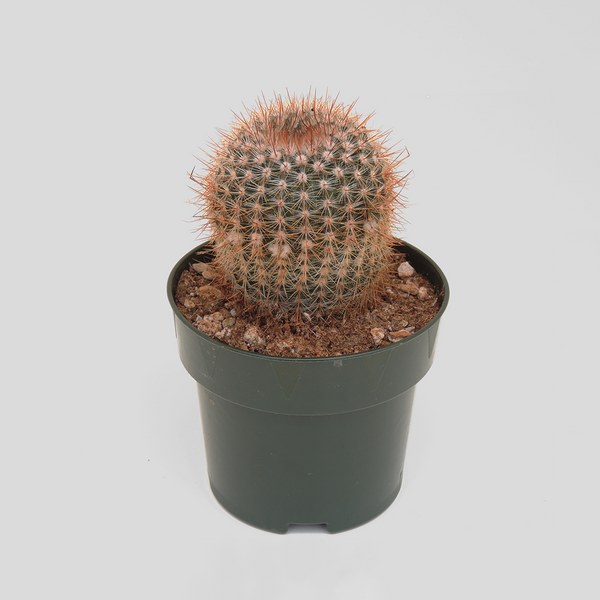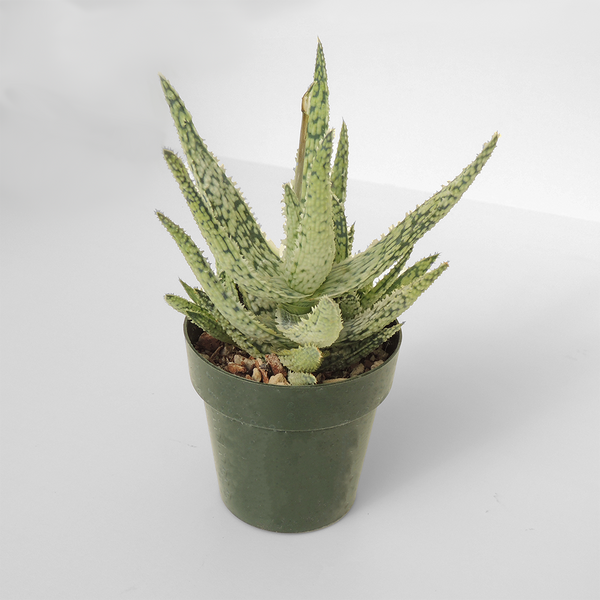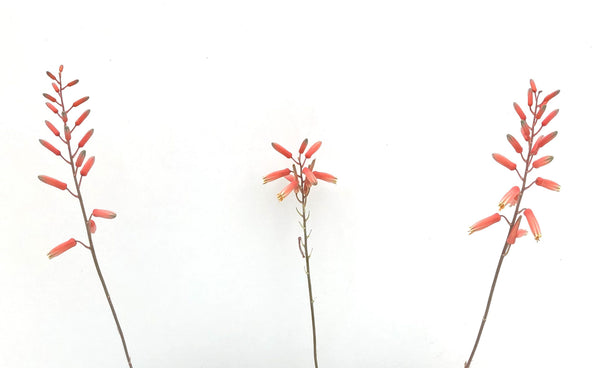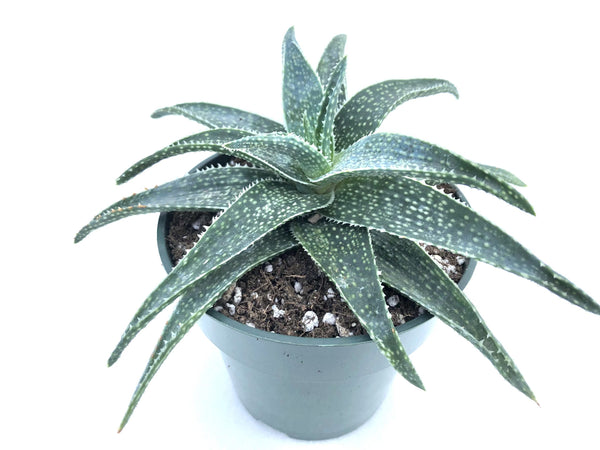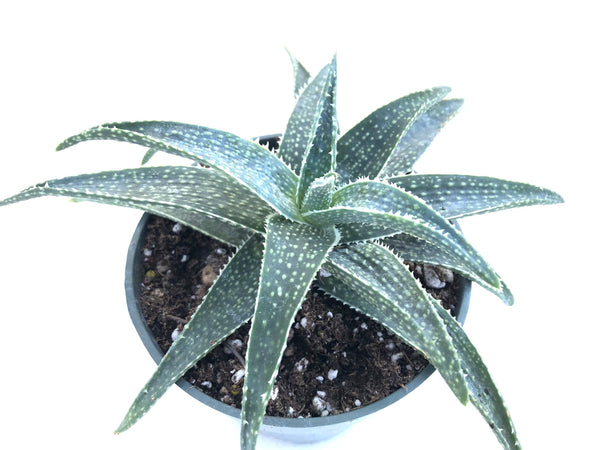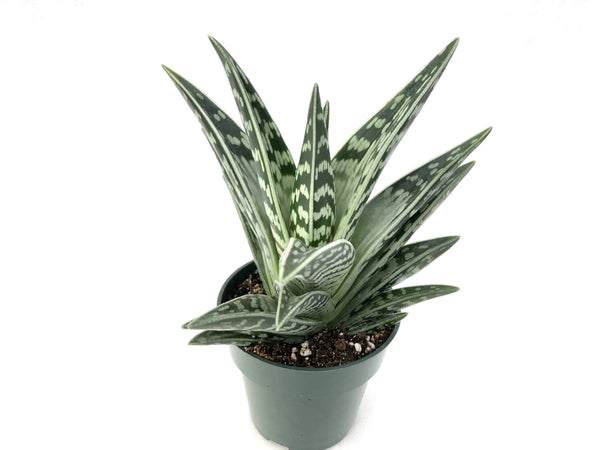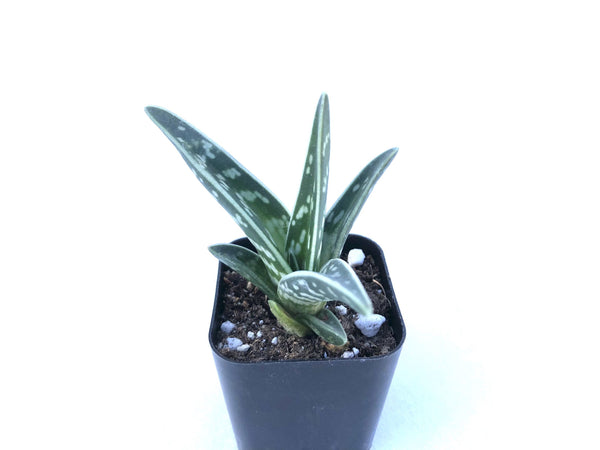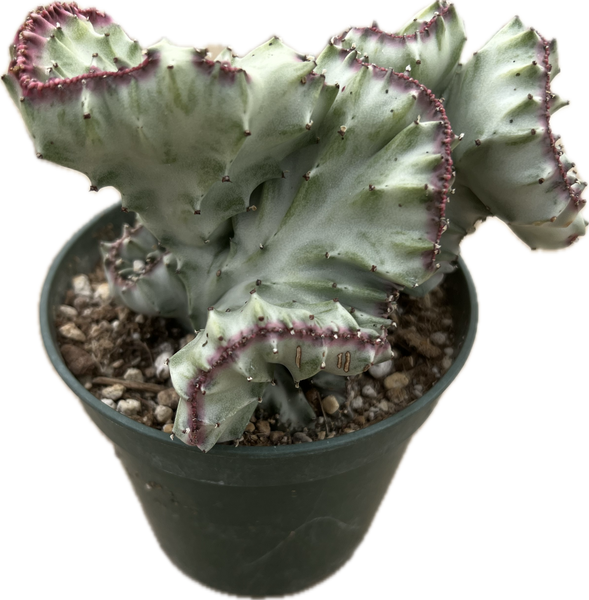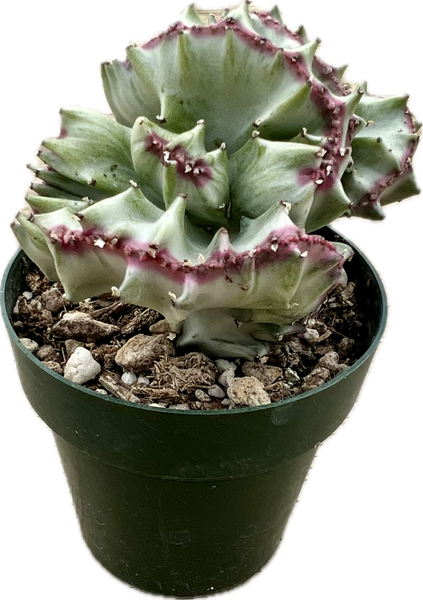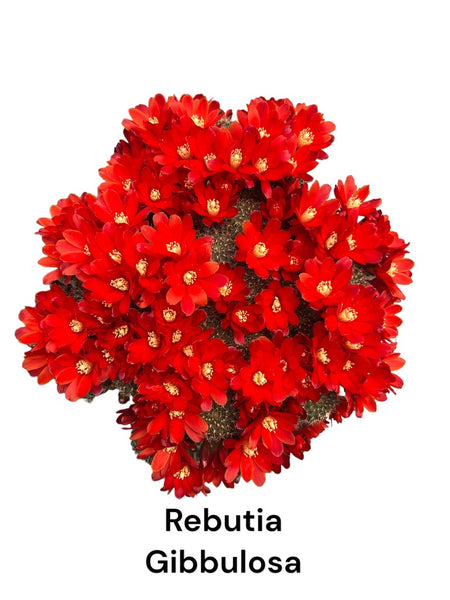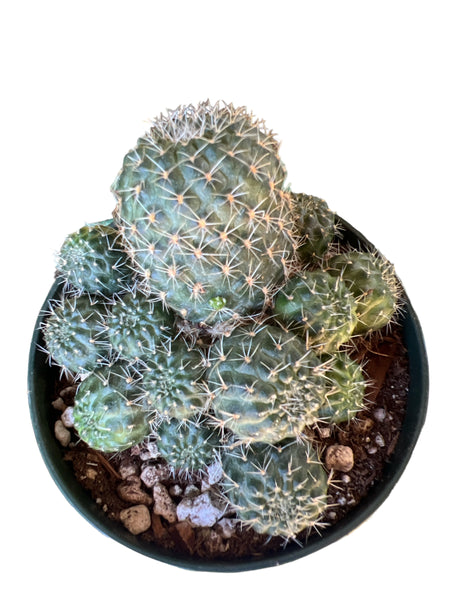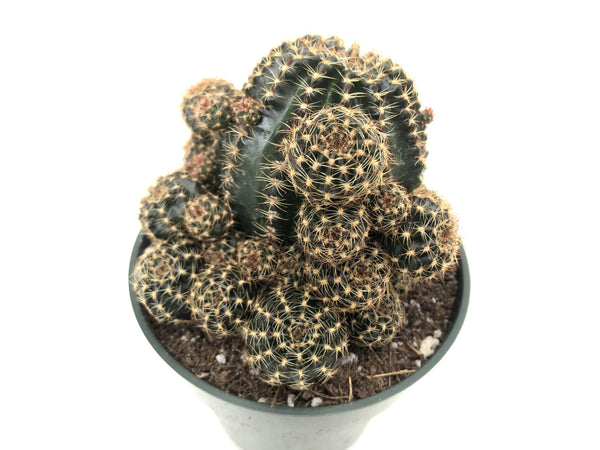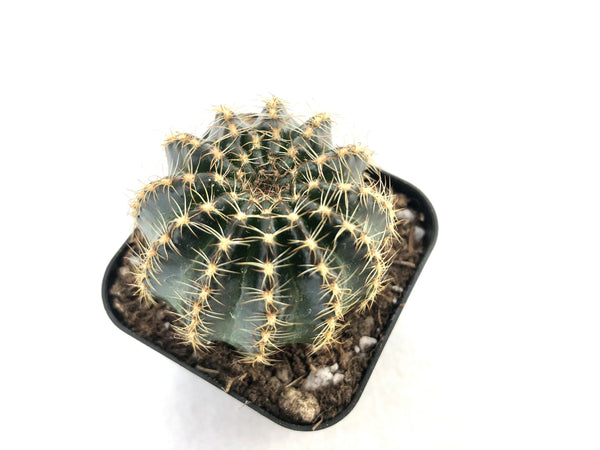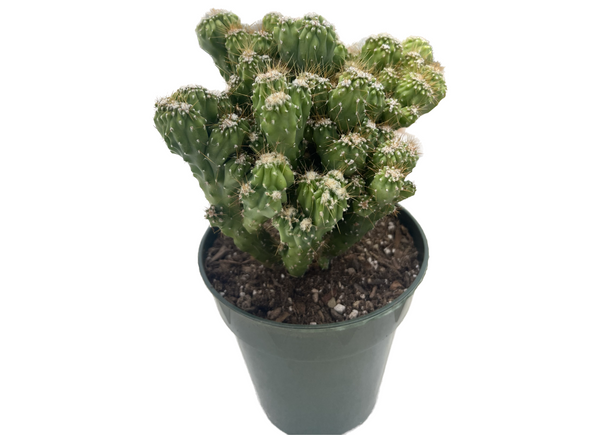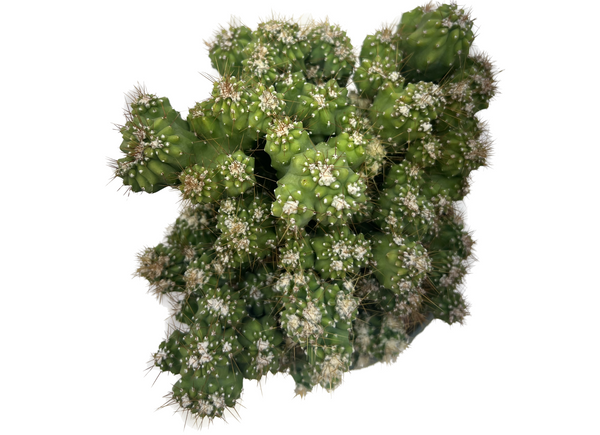Aloe Jucunda
From $4.49
Miniature aloes with small flat rosettes. Bright glossy green leaves have small red brown teeth and white spots. Clusters freely with pink flowers. Heaviest bloom time is Spring through Fall. Grow in filtered light/shades. If grown in strong light or plant is stressed, leaves may turn brown. Slow to moderate grower. Will not tolerate frost. Fertilize once a month with a cacti fertilizer in the Spring/Summer. Keep dryer in the winter. When repotting, use cacti soil.
Rauhii 'Snowflake ' Aloe
From $4.49
Grows in a rosette shape, eventually forming clumps. Leaves mottled with numerous elongated white H shaped spots and tiny white teeth. In full sunlight, the green and white leaves become a purplish orange color. Flowers most heavily in the winter but may flower throughout the year. A moderate grower. Will not tolerate frost. Prefers filtered light. Fertilize once a month with a cacti fertilizer in the Spring/Summer. Keep dryer in the winter. When repotting, use cacti soil.
Marmalade Aloe
From $4.49
Dark blue-green leaves are streaked with "frilly" orange to red bumps, all framed with serrated, frilly edges. Grows in a rosette shape with offsets over time. A slow to moderate grower. Flowers in late Winter/Spring. Sun/part sun. If grown in part shade, leaves may not be as colorful. Will not tolerate frost. Fertilize once a month during Spring/Summer months with cacti fertilizer. Keep dryer during winter month. When repotting, use cacti soil.
Haworthia Cymbiformis Midori no-Sono
From $4.99
These dainty succulents are a small and slow growing plant. Some may have streaks of cream variegation along one edge of the leaf. Translucent orange leaf tips are possible depending on the amount of light. Bright light/indirect light depending on what color you would like the leaves to be. Fertilize with cacti fertilizer once a month during Spring/Summer months. Will not tolerate frost. Keep dryer during winter months. When repotting, use cacti soil.
Parodia erubescens syn. Notocactus schlosseri
From $4.49
An upright slow to moderate growing cactus with red colored spines. This cactus normally does not produce off sets. An easy plant to cultivate. Will usually flower with age around 3-5 years. Shinny-lemon colored flower with a red stamen in the center. Like bright light.
Aloe Diego 'White Lighting'
From $4.49
Very textured mound forming with elongated white markings giving it an almost white appearance. Flowers late winter/early spring. Like indirect light, may turn brown if put in too much sun. Will not tolerate frost. Fertilize once a month during Spring/Summer months with a cacti fertilizer. Keep dryer during winter months. When repotting, use a cacti soil.
Aloe 'Jimmy' Little Gator
From $4.49
Aloe 'Jimmy', also known as Little Gator, is a charming succulent that grows to a height of 3 to 5 inches. It features fleshy, spiny leaves that are green with white variegation. This plant is known for its fast growth rate and its ability to thrive in full sun with well-drained soil. It is fairly drought-tolerant but requires good drainage, especially in the winter to avoid overwatering. This succulent is an excellent choice for container planting, houseplants, rock gardens. It attracts beneficial insects and hummingbirds, and is resistant to deer, rabbits, heat, and verticillium wilt. Aloe 'Jimmy' prefers occasional watering...
Aloe Variegata (Tiger Aloe, Partridge Breast)
From $4.99
Grows in a spiral fashion with new leaves appearing out of the top as the old leaves get pushed down to form the spiral. Has green leaves with white stripes. Plant will flower only when mature, around 5-7 years old. Slow to produce offsets. Grow in indirect light. Plant will turn brown if in too much light. Will not tolerate frost. Fertilize once a month during Spring/Summer with a cacti fertilizer. Keep dryer during winter months. When repotting, use a cacti soil.
Euphorbia lactea 'Cristata Variegata'
From $10.00
Euhorbia lactea 'Cristata Variegats' (also know as the brain) is a small, slow-growing succulent with a stem composed of a continuous series of fan-shaped branches arranged in an alternating, undulating pattern. The stems range in color from white, yellow, and green to pink and violet. The paired spines are mainly located along the ridge of the crest. Place in a sunny window or put outside in the summer, but protect from the frost and too much rain. This euphorbia makes an interesting conversation piece and a nice addition to any collection. These plants are not on grafted stock.
Rebutia Gibbulosa
From $4.99
Rebutia gibbulosa is a small, easy-to-grow cactus that belongs to the genus Rebutia, commonly known as Crown Cacti. These plants are native to high elevations in South America, particularly Bolivia and Argentina. They grow in clusters on the mountains and are frequent bloomers, readily sending out offshoots. Rebutia gibbulosa thrives in bright light and a range of conditions, from partial shade to full sun. However, they do not appreciate high temperatures. During the growing season, from spring to fall, the potting soil should almost completely dry out between waterings, and then be watered thoroughly. In winter, watering should be...
Euphorbia lactea Cristata (Brain Cactus)
From $10.00
Euphorbia lactea 'Cristata' (also know as the brain) is a small, slow-growing succulent with a stem composed of a continuous series of fan-shaped branches arranged in an alternating, undulating pattern. The green form features intricately undulating fan-shaped branches that form snaky ridge or crowded cluster. The plant's striking dark green color is attractively marked with silver-grey zigzag patterns stems range in colors. The paired spines are mainly located along the ridge of the crest. Place in a sunny window or put outside in the summer, but protect from the frost and too much rain. This euphorbia makes an interesting conversation...
Sulcorebutia rauschii
From $6.99
Sulcorebutia rauschii, also known as Rebutia rauschii, is a small, clustering cactus native to Bolivia. It forms dense clumps of dark green to purplish stems, each covered in flat, spirally arranged tubercles. The cactus is adorned with short, black spines that lie flat against the surface, giving it a distinctive, textured appearance. During late spring, Sulcorebutia rauschii produces vibrant magenta flowers with a paler throat, which bloom near the base of the stems. These funnel-shaped flowers can reach up to 2 inches (5 cm) in length, adding a striking contrast to its dark body. The plant thrives in well-draining soil,...
Melocactus conoideus
From $6.99
Melocactus conoideus, commonly known as the Cone-like Turk's Head Cactus, is a cactus species native to Bahia in eastern Brazil. This cactus is characterized by its distinctive, conical shape, which gives it its name. The stem is strongly depressed to hemispherical or conical, typically reaching about 10 cm in height and 17 cm in diameter. The plant has 11 to 15 low and rounded ribs, with small cushion-like areoles that are spaced up to 15 mm apart. The central spine of Melocactus conoideus is straight to slightly recurved. The radial spines are brown, overlaid with grey, and 8-11 spines are...
Rebutia Grandiflora var. red
From $4.99
Rebutia grandiflora var. Red is a dark green, clumping globular species. It typically has 25 spiraling, tuberculate ribs with whitish areoles. The spines are whitish in color, while the radial and central spines take on a brownish hue. This cactus produces diurnal red flowers during the summer months. Great for a beginner grower. It thrives in full sun to partial shade and requires moderate watering in summer and dry conditions in winter. The mature height of this cactus is around 4 inches, and it can spread up to 6 inches in width.
Cereus peruvianus monstrose
From $4.99
The Cereus peruvianus monstrose, also known as the Monstrose Apple Cactus, is a fascinating type of cactus that belongs to the Cactaceae family. This extraordinary plant originates from regions such as Brazil, the Caribbean, and other parts of South America. The cactus is notable for its tall, tree-like growth, with stems that exhibit a unique gray-green color and ribbed texture. What makes the Cereus peruvianus monstrose particularly special is its twisted and contorted stems, which give it a distinctive and intriguing appearance. When it blooms, the cactus produces beautiful white and pink flowers that are truly a sight to behold....
Euphorbia meloformis (Melon Spurge)
From $8.99
Euphorbia meloformis, the melon spurge, has a rounded shape, ribbed stem, and understated blooms drawing the eye and intriguing the mind. Adapted to thrive in harsh environments, yet easy to cultivate in the home, it offers both practical and aesthetic rewards. Whether grown for its sculptural form or as an emblem of the world’s arid wonders, melon spurge continues to inspire admiration and curiosity wherever it is found. Botanical Description: Euphorbia meloformis earns its common name from the plump, rounded, melon-like appearance of its stem. Typically growing to a height of 10-15 centimeters and a diameter of 10-20 centimeters, the...
Notocactus Graessneri v. Flaviflorus
From $4.99
The Notocactus graessneri v. flaviflorus, also known as the Golden Ball Cactus or Yellow-Flowered Parodia, is a captivating and unique species of cactus native to southern Brazil. The Notocactus graessneri v. flaviflorus features a spherical shape with a greenish-yellow body covered in numerous small, golden spines. It typically reaches a height of about 4 inches and a diameter of about 6 inches, making it a compact and manageable addition to any cactus collection. The flowers of this cactus bloom during the late winter to early spring, showcasing small yellow flowers that last one to three weeks. The petals spread upward,...
Echinofossulocactus Crispatus x 130
From $5.49
Echinofossulocactus crispatus, also known as Stenocactus crispatus or the Brain Cactus, is a fascinating and distinctive species of cactus native to the deserts of central and northern Mexico, including regions like Hidalgo, Queretaro, Veracruz, Oaxaca, and Puebla. This cactus is characterized by its unique ribbed structure, which resembles the folds of a brain. The stem is globose to short-cylindric, reaching up to 20 cm in height and 10 cm in width, with a bluish-green to dark olive-green color. The ribs are thin, wavy, and can number between 25 to 80, creating an attractive and intricate pattern. The spines are variable...
Euphorbia Obesa (Baseball Plant)
From $8.99
Euphorbia obesa, commonly known as the Baseball Plant, is a unique and highly sought-after succulent native to South Africa. Its most distinctive feature is its perfectly round, ball-like shape, which closely resembles a baseball—hence the name. The plant is typically grey-green with horizontal stripes or bands that can range from lighter green to reddish or purplish hues, especially when exposed to strong sunlight. Mature specimens usually display eight slightly raised ribs adorned with small bumps, further enhancing its resemblance to a stitched baseball. Size & Growth: Euphorbia obesa is a slow-growing, perennial succulent that remains compact, generally reaching up to...
Trichocereus pachanoi
From $5.49
richocereus pachanoi, commonly known as the San Pedro cactus, is a fast-growing, columnar cactus native to the Andes Mountains of Peru, Ecuador, and Bolivia. It typically grows at elevations between 2,000 and 3,000 meters (6,600–9,800 ft). Description Appearance: The cactus forms upright, bluish-green stems with 6–8 rounded ribs, often branching from the base to create a small tree-like clump. Stems can reach heights of 3–6 meters (10–20 ft), and diameters of 6–15 cm (2.4–5.9 in). The ribs are lined with whitish areoles, each bearing clusters of short, yellow to brown spines, though cultivated specimens are often nearly spineless. Flowers: San...


